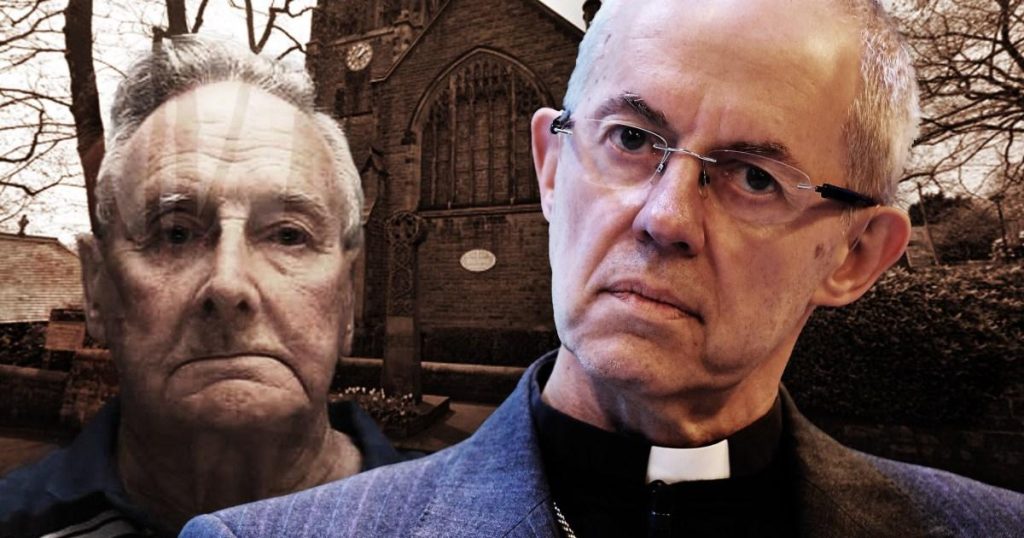Craig Freedman’s life took a devastating turn at the age of 15 when he was caught stealing from the collection box at his local church, St. Peter’s in Woolton, Liverpool. Instead of involving the police, the church’s priest, John Roberts, offered Craig a chance to repay his debt through odd jobs. This seemingly benevolent gesture masked a sinister motive, as Roberts began grooming Craig, showering him with gifts and attention that soon escalated to sexual abuse. At 17, Craig bravely reported the abuse, leading to Roberts’ conviction for indecent assault in 1989. However, the fine and placement on the sex offenders register proved to be a mere slap on the wrist, as Roberts retained his position within the Church of England. This initial betrayal marked the beginning of a decades-long struggle for justice and recognition for Craig.
The Church of England’s response to Roberts’ conviction compounded Craig’s trauma. Then-Archbishop of Liverpool, David Sheppard, publicly denounced the verdict, labeling Craig a liar and dismissing the conviction as a miscarriage of justice. This character assassination shattered Craig’s reputation and severed his relationship with his adoptive family, leaving him isolated and vulnerable. Instead of offering support and compassion to the victim, the Church rallied around the perpetrator, shielding him from the consequences of his actions. This institutional protection allowed Roberts to not only continue his ministry but also ascend within the Church hierarchy, further cementing the power imbalance and silencing Craig. The appointment of Roberts as a Canon of Liverpool Cathedral in 1995 underscored the Church’s disregard for Craig’s suffering and served as a chilling reminder of the institution’s complicity in protecting abusers.
Craig’s ordeal did not end with Roberts’ initial conviction. Years later, Roberts was found guilty of abusing three more victims, two children and one adult, resulting in a 12-year prison sentence. These subsequent convictions validated Craig’s claims and exposed the systemic failure of the Church of England to address the issue of child sexual abuse within its ranks. The fact that Roberts was able to continue his ministry and access vulnerable individuals for decades after his first conviction highlights the profound inadequacy of the Church’s safeguarding procedures. Craig’s case became a stark example of how the institution prioritized its reputation and the protection of its clergy over the safety and well-being of children and vulnerable adults.
Justin Welby, the former Archbishop of Canterbury, became embroiled in the controversy surrounding Roberts. During Roberts’ 2020 trial, Welby testified and apologized for his handling of a complaint against Roberts from another victim, claiming ignorance of the full extent of Roberts’ previous conviction. While Welby expressed regret, Craig demands a full independent investigation into what both Welby and Sheppard knew about Roberts and their subsequent actions. This demand reflects a growing distrust of internal Church investigations and a call for external accountability. Craig’s case, alongside other high-profile abuse scandals within the Church, fueled the demand for greater transparency and independent oversight of safeguarding practices.
The release of the John Smyth report in November 2024 further intensified the pressure on Welby, ultimately leading to his resignation. The report revealed the extensive abuse perpetrated by Smyth, considered one of the most prolific serial abusers associated with the Church, and implicated Welby in failing to act sooner, which could have prevented further harm. This report, coupled with Craig’s persistent calls for accountability, highlighted the systemic nature of abuse within the Church and the need for radical reform. Craig’s unwavering pursuit of justice became emblematic of the broader movement advocating for survivor voices to be heard and for institutions to be held accountable for their failings.
Craig’s experience underscores the urgent need for a thorough and independent investigation into the Church of England’s handling of abuse allegations, particularly within the Diocese of Liverpool. He emphasizes the importance of an external body leading the investigation to ensure impartiality and prevent potential cover-ups. His wife, Gemma, echoes this sentiment, questioning the Church’s commitment to genuine accountability. The Diocese of Liverpool has acknowledged past mistakes and expressed willingness to cooperate with further investigations, but Craig remains skeptical. He believes that true justice for survivors requires not only individual accountability but also systemic change within the Church, ensuring that safeguarding procedures are robust, transparent, and survivor-centered. Craig’s story serves as a powerful testament to the resilience of survivors and a call for lasting change within the Church of England.


